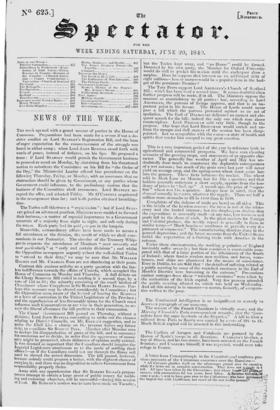NEWS OF THE WEEK.
The Tories call this truce a " capitulation" : but if Lord STAx- LEY gained an advanced position, Ministers were enabled to forward their business,—a matter of especial importance to a Government uncertain of a majority front night to night, and safe only during the recess. Each party had its quid pro quo in the bargain.
Meanwhile, extraordinary efforts have been made to secure a full attendance at the division, the result of which we shall com- municate in our Postscript. The circular of the Treasury Whip- per-in requests the attendance of Members " most earnestly and most particularly" at " early and certain divisions" ; and whilst the Opposition newspapers urgently exhort the well-drilled Tories to " attend to their duty," we may be sure that Mr. WILLIAM HotestEs and Mr. CHARLES Ross are not slumbering at their posts.
Contrast this anxious activity on a party question with the list- less indifference towards the affairs of Canada, which occupied the House of Commons on Monday and Thursday. A dull debate on the Clergy Reserves Bill ended in reading it a second time, by a vote of 152 to 35; the minority consisting of the small Wetion of Churchmer whose Coryphteus is Sir ROBERT HARRY INGLIS. Per- haps this measure may be altered considerably in Committee ; but the Opposition seem aware of the hanrd of leaving the Reserves as a bone of contention in the United Legislature of the Province ; and the apprehension of less filvourable terms fbr the Church must influence such Conservatives as are wise in their generation, to ac- cept the liberal allowance the bill proffers to their communion.
• The Canad.• (;overnment Bill passed on Thursday, without a division ; Lord JOGN RUSSELL consenting to strike out the clauses relating to District Councils, on Mr. ELraen's suggestion, and to make the Civil List a charge on the revenue ing‘bre any future debt, to conciliate Sir ROSSEST PEEL. Member after Member rose to declare his disapprobation of parts of the bill, and to announce his resolution not to divide, in order that the appearance of unani- mity might be preserved, where difference of opinion really existed. It was deemed so important that the Canadians should imagine the Imperial Legislature unanimous as to the mode of settling their affairs !—as if the Canadians could not see through the flimsy veil used to shroud the actual dissension. The bill passed, however, because nobody could propose a better, with the slightest chance of carrying it ; and there was no disposition to relieve Government from responsibility properly theirs.
Away with any apprehension that Sir ROBERT INGLIS'S prepos- terous attempt to obtain a large grant-of public money for build- ing and endowing churches, will be successful—during this session at least. Sir Ront:wr's motion was to have been made on Tuesday,
but the Tories kept away, and "no house" could be formed. Deserted by his own party, the Member for Oxford University would do well to pocket his motion until the exchequer show a surplus. Does he suppose that interest on an additional debt of eight millions— less or more—would be a popular item in the bud- get of the proximate Premier ?
The Tory Peers support Lord ABERDEEN'S Church of Scotland Bill ; which has been read a second time. It seems doubtful when further progress will be made, if at all. The Ministers oppose the measure as unsatisfatory to all parties : but, according to Lord AnnaDEEN, the patrons of livings approve, and that is an im- portant point in his favour. The House of Lords would never pass a bill which the patrons protested against as an act of spoliation. The Earl of DALuousin delivered an earnest and elo- quent speech for the bill; indeed the only one which rose above commonplace. Lord 13noron.ut said very little, though to the purpose. Our hope that Lord IbtouonAtt would enrich anti en- liven the meagre and dull oratory of the session has been disap- pointed. Let us sympathize with the cause—a state of health and spirits that render him unequal to any great exertion.


























